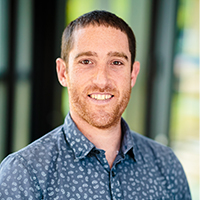
Ben Gray
Title
Chief Innovation Officer
Company
Upcycled Food Association
Ben Gray and Alex Waite will speak on partnering with consumers to meet sustainability goals via upcycling on Thursday, September 23, in the 1:30-4:15 p.m. “Sustainability in pet food” concurrent sessions. Register here.
Learn more about Ben and Alex’s presentation below.
What is upcycling?
Ben: Upcycled food is the easy way for anyone to prevent food waste via the products they buy. Upcycled products prevent food waste by creating new, high quality products out of surplus food. It’s an innovative approach to food waste because it is the first consumer product-based solution to combat climate change, making it highly scalable and economically sustainable. A team of experts from Harvard Law School, Drexel University, World Wildlife Fund, Natural Resources Defense Council, ReFED, The Upcycled Food Association and others officially defined “upcycled food” in 2020 for use in policy, research, by the industry and more: “Upcycled foods use ingredients that otherwise would not have gone to human consumption, are procured and produced using verifiable supply chains, and have a positive impact on the environment.”
How can a pet food producer set sustainability goals?
Ben: Setting sustainability goals can feel overwhelming even for organizations with the best of intentions. From how and where you source raw materials, to logistics, to energy consumption, and even waste generated – sustainability can mean a lot of things! It’s important to take an honest look at where you’re currently at in order to set realistic goals for where you want to be. Based on available resources, this may mean just tackling one area of focus at a time, but these changes can really add up to a big, lasting impact for your organization.
Can you give an example of a successful consumer partnership?
Alex: At Shameless Pets, we created an “ambassadog” program where we’ve built direct relationships with a variety of influencers with shared values and even connect them to each other through an Instagram community we created. We all share photos and experiences with our pets that may or may not even include our brand, but we really just enjoy connecting with the community in that way. I think naturally, these people have become our biggest advocates!
What pets rule the Waite household?
Alex: My two pups, Olivia and Madison, definitely rule the Waite household! Madison, a 9 year old yorkie, has certainly gotten more “shameless” as she’s gotten older, but haven’t we all?? When it’s getting close to dinner time, she’ll pick up her food bowl in her mouth and toss it across the room so everyone is very much informed she’s hungry!
Presentation Description:
Partnering with consumers to meet your sustainability goals via upcycling — Ben Gray, co-founder and chief innovation officer, Upcycled Food Association, and Alex Waite, co-founder and chief product and sustainability officer, Shameless Pets, introduce the upcycled food movement and the Upcycled Certification Program, and share how the certification provides consumers the opportunity to address climate change. In this session, attendees will learn about innovative products already on the shelves, how they might use upcycled ingredients in their product formulations and the benefits of certification toward meeting sustainability goals.
Experience:
Gray is a co-founder and the chief innovation officer of the Upcycled Food Association. He is a registered dietitian, food and nutrition expert, and has served as affiliate faculty at the University of Georgia, Johnson & Wales University and Metropolitan State University Denver. He holds a degree in culinary arts from Johnson & Wales University, a bachelor’s degree in nutrition from the University of Arizona and a master’s degree in nutrition from the University of Georgia. He is excited to support the innovative brands of the upcycled food industry and extraordinary people behind them, and proud to help grow an organization that sees equitable participation and being evidence-based as central to the mission of reducing food waste.

